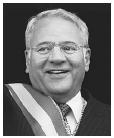BOLIVIA
Gonzalo Sánchez de Lozada Bustamante
President

(pronounced "gahn-ZAH-low SAHN-chess day low-ZAH-dah boo-stah-MAHN-tay")
"We can't be fighting each other and misunderstanding each other, because the country is in crisis."
The Republic of Bolivia is a landlocked country in the center of South America. Bordering Brazil to the north and northeast, Paraguay to the southeast, Chile and Peru to the west, and Argentina to the south, Bolivia is the least developed country in South America. Bolivia's 1,098,580 sq km (424,164 sq mi) occupy a large segment of the Andes highlands and a part of the Amazon jungle. As of 2002, its 8,445,134 inhabitants are mostly of Quechua (30%) and Aymara (25%) descent. Creoles, or mestizos (30%), and people of European descent (15%) account for the rest. Although there are three official languages, Spanish is used primarily in large cities in the business world while Aymara and Quechua are spoken mostly in rural towns and among indigenous communities. More than 40% of the population speak Spanish as their second language. The literacy rate, at 76%, is one of the lowest in South America. The population is predominantly Roman Catholic. In recent years, however, evangelical Protestant movements have made some gains and now comprise 8% of the population. Infant mortality stands at 57.5 per 1,000 births, the highest in South America. Life expectancy is 62 years. With Sucre as its legal capital, Bolivia's economic and political center is La Paz, located at 3,658 m (12,000 ft) above sea level in the Andes highlands. La Paz (1.8 million inhabitants), Santa Cruz (1.3 million), and Cocachamba (500,000) are the largest cities (all populations are as of 2002 estimates).
The unit of currency is the boliviano. The gross domestic product (GDP) was estimated at US $8 billion in 2002. The economy has grown slowly over the past few years, with GDP experiencing a 2.6% growth in 2000, 1.3% in 2001 and2.0% in 2002. Because the population was growing at almost 2% annually, per capita GDP has actually shrunk in the last two years. Inflation remains low, estimated at 2.3% in 2002. Bolivia's main legal exports are natural gas, zinc, tin, gold, soya, silver, wood, and sugar. The country has historically been a major supplier of coca paste, which is refined into cocaine for the international drug trade, but the government's Dignity Plan of 2001–02 was aimed at eradicating coca production. Imports include raw and capital goods for industry, transport equipment, and consumer products.
ADDRESS
Office of the President
Palacio de Gobierno
Plaza Murillo
La Paz, Bolivia
Comment about this article, ask questions, or add new information about this topic: